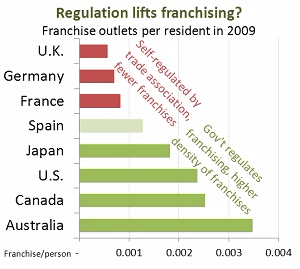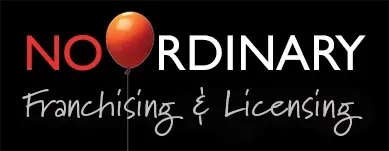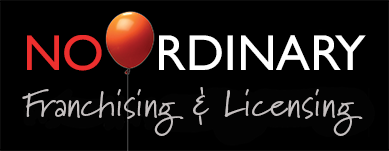Why was a proposal to introduce franchise legislation in New Zealand shelved back in 2009? Was it because of concerns from some in the industry about a possible handbrake on franchising’s growth? Now a new study of franchise regulation around the world suggests that not only does “intelligent” regulation prevent “market inefficiencies”, but it may actually stimulate growth.
Before they suddenly withdrew their support for franchising legislation in 2009, the Franchise Association had provided a Parliamentary Select Committee with six recommendations on what any new franchise legislation might look like. According to Franchise New Zealand magazine, the Association wanted a registration system for franchises offered for sale, franchisees and franchise advisors. It wanted a set of terms which, if broken, could result in any of these registrations being disqualified. And it wanted compulsory disclosure to intending franchisees and compulsory mediation on disputes before legal routes were taken.
All of which, to us, sounds pretty reasonable
Disclosure and mediation were already built into the Association’s Code of Conduct. If anything, the recommendations didn’t go far enough to address the issues which the parliamentary select committee had been reviewing. Registration for franchisors, franchisees and franchise consultants didn’t sound too difficult. The only possibly thorny area in our opinion was what the “terms for disqualification of registration” might be.
Nevertheless there was a backlash, even from the association’s own members, many of whom felt they hadn’t been adequately consulted before the recommendations were made.
“[The recommendations] are far reaching and … [apart from the disclosure requirement] go into new uncharted territory,” said lawyer and past FANZ chairman Stewart Germann, commenting in Franchise New Zealand.
The Franchise Association buckled under pressure and changed its position
With plenty on its plate, the new government was happy to leave the whole franchising industry to regulate itself under the auspices of the Franchise Association.
The irony is that FANZ only represents a minority of franchises in New Zealand and now a new book, The Regulation of Franchising in the New Global Economy, suggests one of the main concerns of franchising legislation’s opponents, that legislation will suffocate franchising’s growth, is in fact a myth.
This graph, presented in an interview by Blue MauMau
with the book’s author, law professor Elizabeth Crawford Spencer, shows that legislation, rather than suffocating growth, may actually create an environment that promotes it.

But wait a minute. Does this indicate that the high density of franchises occur because of the regulation, as the Blue MauMau commentary on the interview seems to suggest, or did the regulation come about in response to the high density of franchises?
New Zealand bucks the trend
Here’s something else that Blue MauMau didn’t consider. The nice consistent slope of the trend line would naturally be disrupted if New Zealand, which has one of the highest densities of franchises in the world, were to be added. On the other hand, the growth of franchising in New Zealand did stall recently, while the Australian industry has grown vigorously despite its regulated environment.
Spencer argues in another interview in Blue MauMau that regulation is needed not only to address franchise abuse, but to help prevent what she calls “costly market inefficiencies”.
"You have franchisees committing suicide"
“If you take the laissez faire
approach and argue that people are grown-up business people entering into contracts who know what they're doing, the pain is that you have less efficient markets,” she said in the Blue MauMau interview . “You have franchisees going bust because of warped processes and information that obfuscate how their money is being used. You have franchisees committing suicide. You have franchisors becoming insolvent, while leaving a path of unchecked financial destruction in their wake. I'd say that if we don't improve regulation, we will see more failed businesses, less efficient business interactions that create unnecessary costs due to the lack of understanding of the parties and … an inefficient shifting of risk that is inherent in franchising.”
According to the blurb for her book, Spencer believes that “properly calibrated regulation can minimize inefficient allocations of power and risk and lead to maximum economic and social benefits by promoting the development
of small business, enabling the growth of entrepreneurial skills, and facilitating economic well-being and independence among SMEs.”
"Exclude the riff-raff from the marketplace"
In his review of Spencer’s book, franchisee attorney Andrew Selden summed up the benefits a bit differently. "Any sentient franchisor should encourage regulation, if only because it tends to exclude the riff-raff from the marketplace," he declared. "The challenge is to keep the regulation effective, and short of suffocating."
Hear, hear.
One advocate of franchising regulation who has been consistent in his calls for change for many years is Gehan Gunasekara, associate professor in commercial law at Auckland University.
"New Zealand has been lagging behind Australia," he said in a NZ Herald
article. "Strict regulation has not held back franchisors in Australia."
In fact, Gunasekara puts a lack of growth in Kiwi franchisors expanding overseas down to weak regulation on home soil.
I'm Robin La Pere of No Ordinary Business and Franchise Consultants.
In addition to being a franchise consultant, I have a background as a franchise manager and Managing Director of my own franchise company.
It amazes me given the scale of franchising that some countries such as New Zealand and Great Britain have no specific franchise laws, yet others such as Australia and the United States are quite heavily regulated. In this article, I explore some of the pros and cons of franchise regulation.
I am based in Auckland, New Zealand, but work with clients all over the world. To arrange for a free Initial Consultation, no matter where you're based, contact me at robin@noordinary.co.nz or use the Contact Form.
Relevant Articles
Subscribe to my newsletter
"Robin writes an e-letter which anyone interested in franchising should subscribe to - whether they agree with him or not!"
Dr Ken Billot, Franchise PhD
Dr Ken Billot, Franchise PhD
Every two weeks, I write an email newsletter designed for those in franchising and those considering getting into franchising. Topics include those you see in the articles listed above and are intended to be stimulating, helpful and challenging. These articles have helped me gain more than 100,000 followers on Twitter and worldwide connections on LinkedIn, but you can read them first by subscribing to the newsletter.
Subscribe by entering your email address here:



